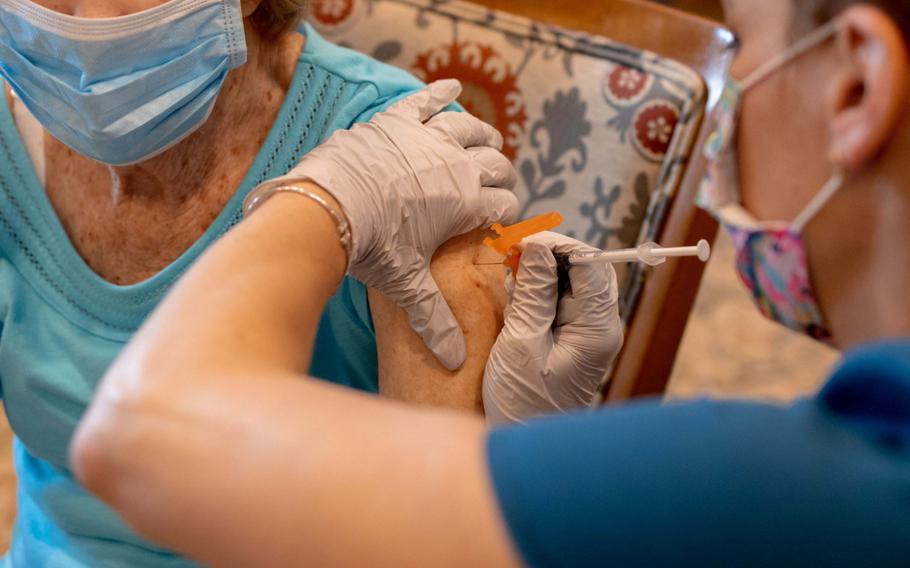
A health care worker administers a third dose of the Pfizer-BioNTech Covid-19 vaccine at a senior living facility in Worcester, Pa., on Aug. 25, 2021. (Hannah Beier/Bloomberg)
Federal regulators are seriously considering authorizing coronavirus vaccine boosters for everyone 40 years old and older, a move that could sharply increase the number of people eligible for the shots, according to two federal officials familiar with the plans.
Action would not occur until next month, after the Food and Drug Administration deals with two big items on its agenda, said the officials, who spoke on the condition of anonymity because they were not authorized to discuss the issue.
The FDA is expected Wednesday to authorize a booster shot of the Moderna vaccine for people 65 and older and for people at special risk of COVID-19, and an extra shot of the Johnson & Johnson vaccine for people 18 and older. The broader age criteria for Johnson & Johnson reflects lower protection offered by the initial single-shot regimen compared with other coronavirus vaccines. A booster shot of the Pfizer-BioNTech vaccine already is cleared for people 65 and older and for people at higher risk because of medical conditions or exposure on the job.
The other big issue pending at the FDA is authorization of the Pfizer-BioNTech vaccine for children 5 to 11 years old, which could happen this month or early next month.
Senior federal health officials have been eager to lower the eligibility age for booster shots because of concerns that some middle-aged people are becoming ill with COVID despite being fully vaccinated. Israeli data suggests that extra shots can help prevent serious illness among that population.
When the Biden administration in August announced plans to provide boosters, officials said they wanted everyone 18 and older to get the extra shots but ran into resistance from outside advisers and even some of their own vaccine experts. The officials backed off, focusing initially on boosters for people 65 and older and others with medical conditions or other risks.
But last week, in a meeting with the FDA's outside advisers, Peter Marks, a top vaccine regulator at the agency, raised the possibility of reducing eligibility for boosters to age 40 and older. Several members of the advisory committee expressed support, including Arnold Monto, professor of public health and epidemiology at the University of Michigan and chairman of the vaccine advisory committee.
"The concern that I have is that we don't want to wait until we see some more severe infections in the under 65-year-old general population, because getting this vaccine out takes time and requires extreme logistic efforts," Monto said.
CNN first reported that the FDA is considering reducing the age to 40 and older for the Moderna and Pfizer-BioNTech boosters.
But reducing the age for boosters "is not as urgent" as getting the kids' vaccines authorized, clearing the Moderna and Johnson & Johnson boosters, and greenlighting the "mixing and matching" of boosters, one of the officials said. That authorization for mixing and matching is expected to come Wednesday, with the FDA saying people can use boosters different from their original vaccines.
People under 40 who are at special risk of COVID would still be eligible for the Moderna and Pfizer-BioNTech boosters.